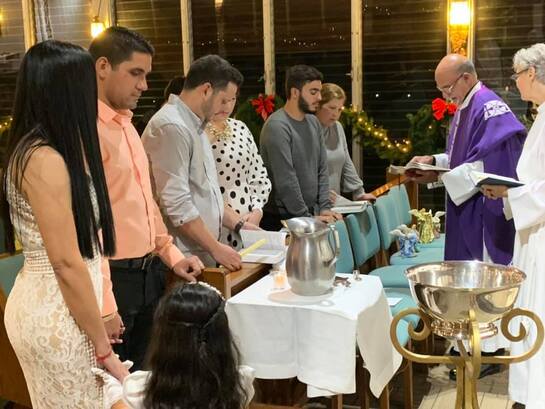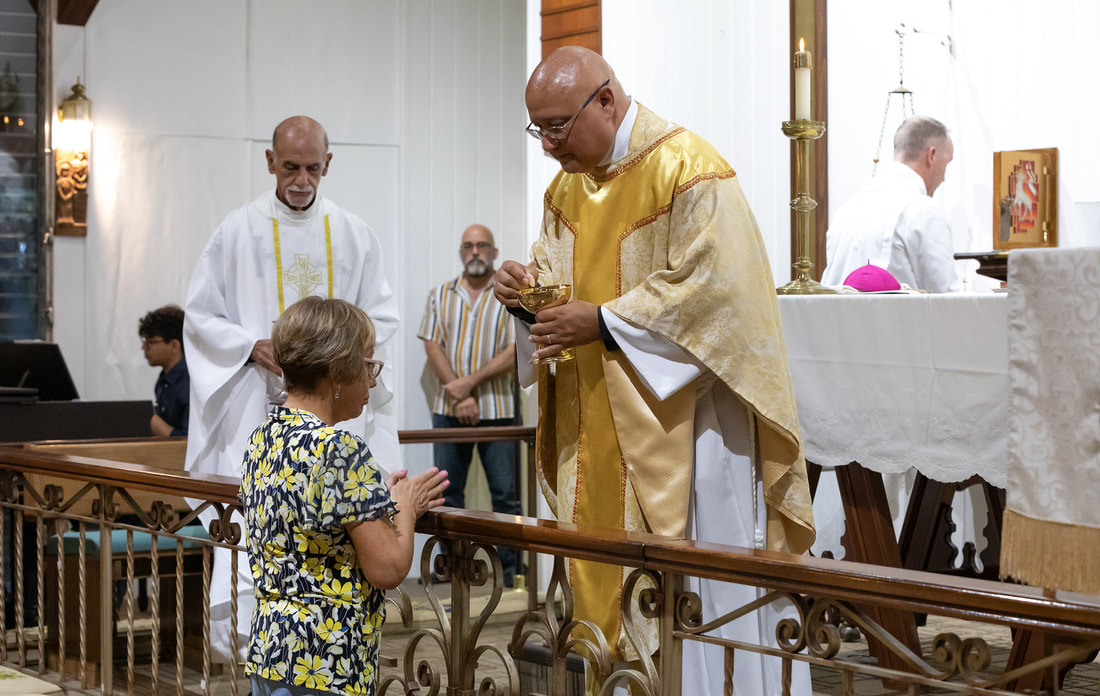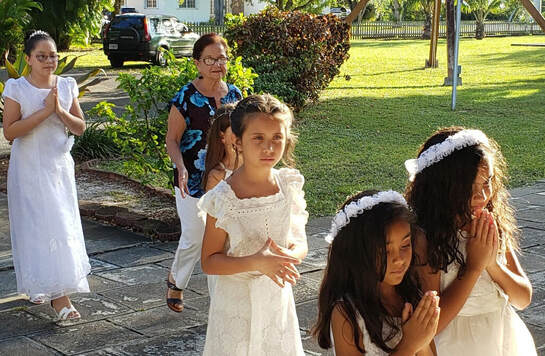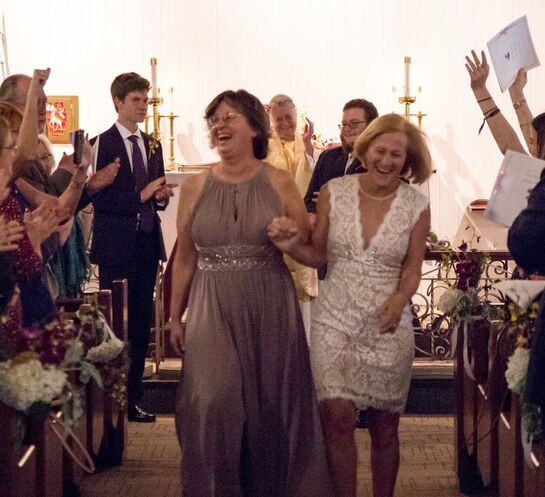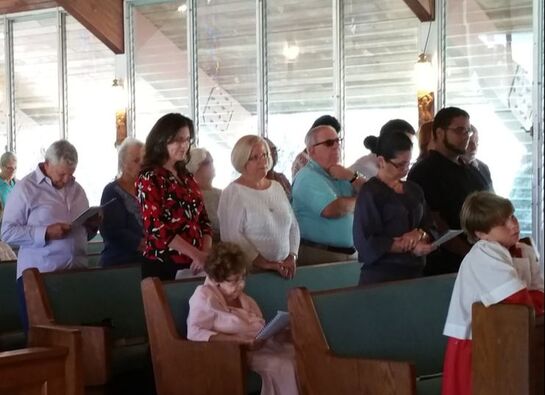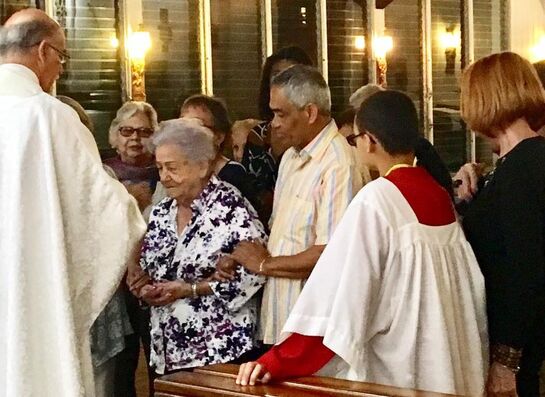The Sacraments
Baptism
|
This is the initiation by water and the Holy Spirit into the church. God establishes an everlasting bond with each person in baptism, adopting us, making us members of the church (Book of Common Prayer, pp. 298, 858). In baptism we are made sharers in the new life of the Holy Spirit and the forgiveness of sins. Each candidate for baptism in the Episcopal Church is sponsored by one or more baptized persons (godparents). Sponsors speak on behalf of candidates for baptism who are infants or younger children and cannot speak for themselves at the Presentation and Examination of the Candidates. Candidates are baptized "in the Name of the Father, and of the Son, and of the Holy Spirit," and then marked on the forehead with the sign of the cross. The newly baptized is "sealed by the Holy Spirit in Baptism and marked as Christ's own forever." The baptismal promises are made for infants by their parents or sponsors, who “guarantee that the infants will be brought up within the Church, to know Christ and be able to follow him" (Book of Common Prayer, pp. 858-859).
|
Eucharist
|
The sacrament of Christ's body and blood, and the principal act of Christian worship. Jesus instituted the Eucharist "on the night when he was betrayed." At the Last Supper he shared the bread and cup of wine at a sacred meal with his disciples. He identified the bread with his body and the wine with his blood of the new covenant. Jesus commanded his disciples to "do this in remembrance of him" (see 1 Corinthians 11:23-26; Mark 14:22-25; Matthew 26:26-29; Luke 22:14-20). Christ's sacrifice is made present by the Eucharist, and in it we are united to his one self-offering (Book of Common Prayer, p. 859). The Last Supper provides the basis for the fourfold Eucharistic action of taking, blessing, breaking, and sharing. Christ's body and blood are present in the sacrament of the Eucharist and received by faith.
|
Confirmation
|
The adult affirmation of our baptismal vows. Those who were baptized at an early age and those baptized as adults without laying on of hands are expected to make a mature public affirmation of their faith, recommit themselves to the responsibilities of their baptism, and receive laying on of hands by a bishop (Book of Common Prayer, p. 412). The Episcopal Church's theology of Confirmation has continued to evolve along with its understanding of baptism. Confirmation is no longer seen as the completion of Christian initiation, nor is Confirmation a prerequisite for receiving communion. Confirmation has been increasingly understood in terms of a mature, public reaffirmation of the Christian faith and the baptismal promises. Some dioceses require that candidates for Confirmation be at least sixteen years old to insure that the candidates are making a mature and independent affirmation of their faith.
|
MARRIAGE
|
The sacramental rite of the church in which a couple "enter into a life-long union, make their vows before God and the Church, and receive the grace and blessing of God to help them fulfill their vows" (Book of Common Prayer, p. 861). At the Declaration of Consent, the couple promise to love, comfort, honor, and keep their spouse, in sickness and in health, and, forsaking all others, to be faithful to their spouse as long as they both live (Book of Common Prayer, p. 424). The congregation witnesses the couple's promises, and the members of the congregation promise to do all in their power to uphold the couple in their marriage. At the Marriage, the couple may pledge their lives to each other by the giving and receiving of rings as symbols of their vows. When desired, other appropriate symbols of their vows may be used instead of rings. In the Episcopal Church it is required that at least one of the parties be a baptized Christian, that the ceremony be attested by at least two witnesses, and that the marriage conform to the laws of the state and the canons of the church. The member of the clergy who will solemnize the marriage typically meets with the couple on several occasions prior to the service to discuss the meaning of Christian marriage in the couple's life.
|
CONFESSION
|
An acknowledgment of sin, as in Psalm 51: "Against you only have I sinned and done what is evil in your sight." Confessions of sin during the liturgy are general, made by all the people. The church also provides for confessions of sin by individual penitents, and for their absolution, pronounced by a bishop or priest. A declaration of forgiveness may be stated by a deacon or lay person who hears a confession. The Book of Common Prayer provides two forms of service for the Reconciliation of a Penitent (p. 447, 449). The Reconciliation is one of the sacramental rites of the church (p. 861). The secrecy of the confession is morally absolute for those who hear a private confession. While the Reconciliation of a Penitent is detailed for individuals in the Book of Common Prayer, it is more rare in our church. The utilization of the Lord's Prayer as a rite of reconciliation and the forgiveness of sins is done every Sunday and serves as a general rule of thumb, but confession will always be heard if so desired.
|
ANOINTMENT
|
Sacramental use of oil as an outward sign of God's active presence for healing, initiation, or ordination. Anointing with oil by smearing or pouring may accompany prayers for healing (unction) and the laying on of hands in the rite for Ministration to the Sick (Book of Common Prayer, p. 453). The signing with the cross of the newly baptized may be done by anointing with the oil of chrism, which signifies that the person is "sealed by the Holy Spirit in Baptism and marked as Christ's own for ever." (Book of Common Prayer, p. 308). The oil for anointing may be scented, with different fragrances used in services for healing, initiation, or ordination. Anointing may also be done at the time of death. After the seventh century, western Christianity associated the rites of unction with penitence and death. This differed from the earlier practice of anointing for healing and recovery from illness. Unction became a rite reserved for situations in extremis, near death.
|
For more information, or for definitions of terms, please visit The Episcopal Church's Library Website

